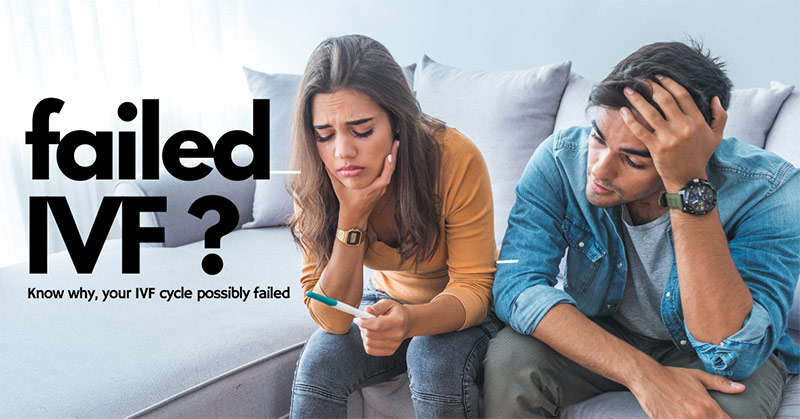Why does IVF treatment fail?
Why does IVF fail?
With the advancement of medical science an array of treatments is now available enabling millions of couples who fail to conceive naturally achieve their parenthood dreams. These treatments are risk free and can be planned in advance as advised by the infertility doctor. All treatments come with a success rate and vary from clinic to clinic. However, many times patients who undergo IVF are left disappointed but mostly confused as to why their treatment was not a success.
What are the possible reasons for an IVF failure?
Both internal and external factors impact how successful the IVF cycle will be. Widely speaking, good number of healthy eggs, good endometrial thickness, healthy sperms with no abnormality and good mobility, a uterus to successfully hold the baby and support a steady growth of the foetus are predominantly the drivers to achieve success. Other factors that invades the fertility rate are related to the different lifestyles and day to day activities over a period of time such as long-term use of anabolic steroids, abnormalities in DNA, Genetic trait, Smoking, excessive intake of Alcohol or Caffeine etc.
Externally, the role of embryologist, IVF specialists involved in egg retrieval and egg transfer, advance technologies used in the laboratory largely governs the success rate.
Poor sperm morphology and Low/ nil sperm count
Sperm morphology refers to the shape of the sperm namely head, the mid-piece and the tail. Normal sperm have an oval head with a long tail. Head shape is important, and has the ability to penetrate the surface of a woman’s egg to fertilize it while the tail guides the sperm in its motility. Healthy sperm with normal morphology can swim well in a straight line and is a gene carrier. However, sperm morphology alone does not guarantee pregnancy.
Sperms with poor genetic content will result in an abnormal embryo. When IVF is performed with a poor sperm sample, failure chances increases significantly. Similar is the case when sperm count is low or nil. Here there will be not enough number of viable sperms required to fertilize an egg. In cases where sperm quality and parameters for quantity are skewed from what is supposed to be an ideal sperm sample, injection of sperm into the ooplasm of a mature oocyte is possible and is termed as intra-cytoplasmic sperm injection (ICSI). A single living healthy sperm is required to perform ICSI on oocytes. The processing, isolation, and selection of a single healthy sperm from a moderately fertile man can be quite a challenge sometimes.
Poor egg quality
Oocyte quality is a limiting factor in female fertility. The embryo, in its developmental phase is largely determined by the quality of the oocyte. Mainly three aspects influence oocyte quality – morphological, cellular, and molecular. Quality of oocytes is mostly determined by its appearance and its performance after fertilization. There are some factors which affect the quality of an oocytes. When a woman is ageing, she experiences several changes in her body and in their lifestyle that lead to poor egg quality which results abnormal embryo development. Embryos which are prepared by using such oocytes will be of poor quality and hence leading to a failed IVF.
Role of Clinical Embryologist and Laboratory
One emblematic factor that defines the success rate of a particular infertility clinic/hospital is its embryologist. It requires years of experience to achieve expertise. Embryologists play a pivotal role in IVF Laboratory from egg retrieval to embryo transfer and cryopreservation as well as overall maintenance of laboratory. On the day of egg retrieval, embryologist examines ovarian fluids. The oocytes are then collected, inseminated with prepared sperm sample in a culture dish (IVF/ICSI) which is then placed in the incubator. The following day the eggs are checked under the microscope and replaced into the incubator for the process of fertilization to resume. Here, the temperature and pH conditions in the incubator mimic that of a healthy uterus. These optimal conditions enable the fertilized egg to become an embryo. On the day 3 or day 5, the best quality of embryos is selected by an embryologist in the transfer catheter. The fertility specialist then transfers the embryo into the uterus.
Embryologists follow the strict criteria such as air quality, temperature, pH level, VOC level and humidity to maintain the necessary condition for any good IVF laboratory.
Role of IVF specialist and doctors
All through the IVF journey the patient is exposed to information and advices that the IVF specialist doctor discusses with them. After stimulation process when eggs are picked up, there could be chances of less or no eggs picked. Similarly, during the embryo transfer precision plays a vital role which comes only with expertise and experience of the performing specialist.
Nevertheless, ever since IVF came into being, the success rate has continued to go higher. New life India Fertility Centre proudly celebrates its high success rate and high patient satisfaction rate. Our specialists have over than 20 years of experience with back to back successful pregnancies recorded. This has been made possible also by our team of medical and non-medical professionals with years of experience and dedication towards one goal – Turning your parenthood dreams into reality.
